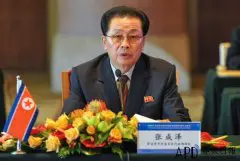In recent years, disunity has become more apparent in Latin America, both domestically and among regional countries.
Brazil's former president Luiz Inacio Lula da Silva was sentenced to jail last year. While some regard it as a temporary victory in Brazil's fight against corruption, others believe that it's another political maneuver following the impeachment of Dilma Rousseff, and a result of political persecution by vested interests and politicians against civilian presidents.
In Venezuela, any policy by Nicolas Maduro's government is harshly criticized by opposition forces. The opposition resorts to street politics and endeavors to push Maduro to step down, but their attacks have been stricken with powerful counterblows by Maduro. No sign of improvement has been seen so far in Venezuela.
Such disunity is rising in Columbia, Peru and other Latin American countries. Disunity among regional countries has also become increasingly prominent. At the eight Summit of the Americas, held in Lima recently, host country Peru refused to invite Venezuela to the meeting. Some Latin American countries severely criticized the Maduro government and even pledged to reinforce the isolation of Venezuela.
There are 33 countries in Latin America and the Caribbean. It's difficult for these countries to reach a high-level consensus and a unified stance on all issues. But at least they should have a spirit of mutual understanding and accommodation. Unfortunately, these countries have become less united since the political wind vane started to swing in Latin America in the 1990s.
Many factors have contributed to Latin America's disunity. To begin with, the region doesn't have perfect political rules. Since the third wave of democracy started in the 1980s, Latin America has seen smooth political development, but political rules are not perfect. The rules cover many aspects, of which a political party's handling of relations with other parties, the government, social communities and the public is the most important. Therefore, deficiencies in political rules will inevitably harm party politics and damage relations among parties, the government, social communities and the public.
Although the region is to be lauded for its relentless efforts, Latin America has not succeeded in its exploration of developmental paths. Many Latin American countries, facing the negative consequences of economic reforms, have been endeavoring to strengthen state intervention and resorting to populist means to promote societal development since the end of the 1990s. But with economic depression, this has brewed ferocious fights among different political forces.
Fighting corruption has become an important tool in political fights. Nobel laureate Mario Vargas Llosa once said that corruption is the greatest threat to Latin American democracies. Regional countries are determined to fight corruption and have gained outstanding achievements in this regard. But undeniably, the anti-corruption campaign has increasingly become an important weapon for political parties to attack their opposition.
It's worth noting that disunity in Latin America is connected to the US. Washington's support for a military coup against the Venezuelan government in 2002 is an open secret. To protect its "backyard," Washington's selfishness was laid bare.
Disunity has hurt Latin America's international image, jeopardized the investment environment in the region, crippled the basis for party politics and wasted political, economic and diplomatic resources. It has even created obstacles for Latin America to develop ties with China.
(GLOBAL TIMES)
 简体中文
简体中文

